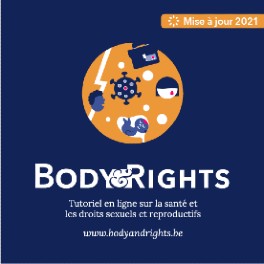
Body&Rights, the e-learning on sexual and reproductive health and rights internationally, developed by Sensoa and the SRHR Working Group of Be-cause Health, the Belgian platform for international health, is fully up-to-date.
 Body&Rights, the e-learning on sexual and reproductive health and rights internationally, developed by Sensoa and the SRHR Working Group of Be-cause Health, the Belgian platform for international health, is fully up-to-date.  Photo by Giulia May on Unsplash Photo by Giulia May on Unsplash Sensoa's annual review of the expenditure of the Directorate-General for Development Cooperation and Humanitarian Aid (DGD) shows that expenditures for health and reproductive health increased from €133 million in 2019 to €141 million in 2020. This is mainly due to an increase in the expenditures for reproductive health from €24.86 million to €33.45 million, and particularly due to the increased investment in sexual and reproductive health in Belgium's existing governmental cooperation programmes with partner countries. Sensoa asks Minister of Development Cooperation Meryame Kitir to continue on this growth path, established during the previous legislature. Maintaining and expanding this level requires that sexual and reproductive health and rights, including HIV, systematically receive the necessary attention and resources within the new bilateral cooperation programmes. 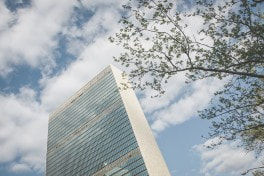 Photo by Thomas Eidsvold Photo by Thomas Eidsvold The yearly Commission on Population and Development (CPD) suffered from the consequences of the lockdown measures in response to the COVID-19 pandemic. Having been postponed and changed into virtual gatherings did help to not bring member-states closer to a joint recognition of the outstanding challenges. 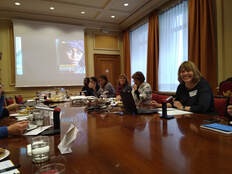 ICPD Debriefing in Belgium's Senate. UNFPA Brussels Director Sietske Steneker on the right. ICPD Debriefing in Belgium's Senate. UNFPA Brussels Director Sietske Steneker on the right. Belgium’s all-party parliamentary group ‘Parliamentarians for the 2030 Agenda’ hosted a seminar on 25 years ICPD Programme of Action in the Belgian Senate, days after the ICPD Nairobi Summit of 12-14 November. Taking stock UNFPA Brussels Director, Sietske Steneker, introduced the MPs to the successes as well as the unfinished business in realising the ICPD Programme of Action. In the past 25 years, maternal mortality dropped by 40%, adolescent birth rates by one third, early marriages by one fourth and more women had access to family planning. At the same time, progress has been slow and uneven. In Sub-Saharan Africa, maternal mortality remains an enormous challenge. Worldwide, only 50% of all women have the right to decide to use family planning. The barriers are multiple, including the out-of-pocket costs, the mentality of service providers, and, at the core of it all, the persistence of gender inequality. 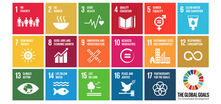 On October 10th, at the federal parliament in Brussels, the ‘Parliamentarians for the 2030 Agenda’, Belgium’s APPG on sexual and reproductive health and rights, kicked off for a new legislative period. The group unites parliamentarians from all colours, invested in advancing gender equality, health and rights internationally, as put forward in the ICPD Programme of Action and the SDGs. The group, likely to make up around 30 members, will see to Belgium’s international role to achieve the ICPD PoA and the SDGs, and more specifically SDG 3, to achieve health and wellbeing for all, and SDG 5, to achieve gender equality and women’s empowerment. They will do so by convening regularly, informing the public, participating in international delegations, visiting the field, inquiring the government and drafting resolutions. Early October Inspire, the European Partnership for Sexual and Reproductive Health and Rights (SRHR) convened European and international SRHR advocates in the ancient city of Athens. The conference focused on the upcoming 25th anniversary of the International Conference for Population and Development (ICPD) in Cairo (1994) and collected best practices as well as European input for the ICPD Nairobi Summit. Participants were invited to share successes by the SRHR community, and to reflect on the ongoing push-backs to SRHR from conservative and populist movements.
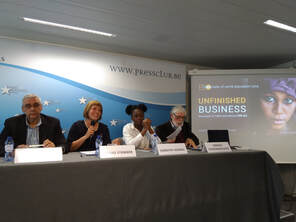 SWOP 2019 Launch Brussels SWOP 2019 Launch Brussels UNFPA launched the State of the World Population 2019 in Brussels, May 7th, entitled ‘Unfinished Business. The pursuit of rights and choices for all’. Marking the 25th anniversary of the ICPD Programme of Action (PoA) as well as the 50th birthday of UNFPA itself, the report highlights the progress made, and the challenges ahead. Belgium’s Directorate General for Development (DGD) Deputy Director Guy Rayée opened the launch, reminding everyone about the milestone the Cairo Programme of Action was. Tremendous progress has been made since, particular for women and their access to family planning. 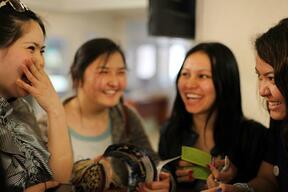 Adolescent girls. Copyright IPPF EN Adolescent girls. Copyright IPPF EN “Belgium is determined to build a world in which no one, not a single child, not a single young person, not a single woman nor a single girl is left behind.” These were the closing words with which Belgium reconfirmed its strong commitment to the full implementaton of the International Cairo Programme of Action (ICPD) at the 52nd CPD, 1-5 April 2019. On April 1st the UN Commission on Population and Development unanimously adopted a political declaration reaffirming the importance of the ICPD Program of Action. 2019 marks the 25th anniversary of the adoption of the Program of Action of the International Conference on Population and Development by 179 UN Member States in Cairo, Egypt in 1994.
Parliamentarians from all continents call for full implementation of ICPD Programme of Action28/11/2018
Ottawa, 23 October 2018 – More than 90 parliamentarians from over 70 countries have agreed on a forward-looking declaration that aims to foster understanding of, and consensus around, the urgency to address the current political discourse on sexual and reproductive health and rights. Jean-Jacques Flahaux (MR) and Petra de Sutter (Groen), members of the Belgian all-party parliamentary group, ‘Parliamentarians for the 2030 Agenda’, participated in the conference.
|
